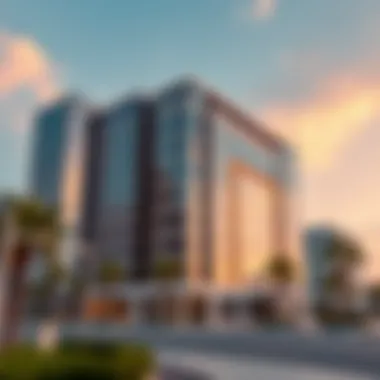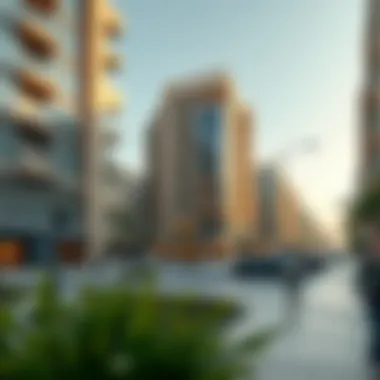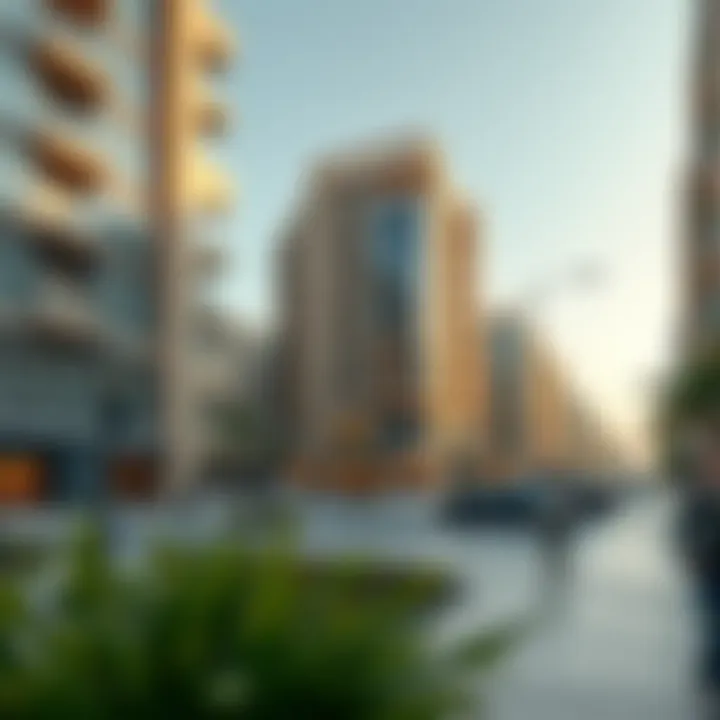Real Estate Projects in the Emirates: An In-Depth Review


Intro
The real estate landscape in the Emirates stands as a testament to rapid growth, ambition, and innovation. As one of the world’s most dynamic markets, this region offers a plethora of opportunities for investors, agents, and homebuyers alike. Understanding the nuances behind various projects is crucial, especially as demand continues to rise. From bustling Dubai to the more traditional Abu Dhabi, each area has its unique allure that shapes investment decisions.
What makes this market particularly attractive? It's a blend of favorable government policies, robust economic growth, and a vibrant expat community. With each passing year, new developments reshape the skyline, capturing global attention and facilitating unique investment opportunities.
Throughout this article, we dive deep into the prevailing market trends, analyze property prices, and forecast future projections. We will also reveal hotspots for investment—areas where substantial returns are expected. By the end, whether you're an experienced investor or just dipping your toes into the property market, you’ll be equipped with comprehensive insights into the UAE’s real estate sector.
Overview of Real Estate in the UAE
The real estate landscape in the United Arab Emirates holds significant importance in both local and global contexts. As the country continues to evolve as a hub for business and luxury living, understanding the intricacies of its real estate offerings is crucial for investors, home buyers, and industry stakeholders alike. This overview will set the stage for a deeper discussion into the various dimensions of the UAE's property market, emphasizing historical significance, current trends, and future potentials.
Historical Context
To truly grasp the pulse of the UAE's real estate market today, one must look back at its historical backdrop. The rapid transformation from a collection of fishing villages to a sprawling metropolis is nothing short of remarkable. In the 1970s, the discovery of oil marked the genesis of economic development, leading to a burst of construction that reshaped cities like Dubai and Abu Dhabi. The country's strategic investments turned it into a beacon for global investment, drawing expatriates and nationalities from all corners of the globe.
Such historical roots provide a framework through which current investments and developmental strategies can be understood. The embrace of world-class architecture and infrastructure was not merely aesthetic; it was aimed at positioning the Emirates as a competitive player in the global stage. Significant milestones, such as the launch of iconic projects like the Burj Khalifa and the Palm Jumeirah, showcased the Emirate's ambition and appetite for monumental achievements. With each passing decade, the foundation laid during this early development period has supported an ever-expanding market.
Current Market Landscape
The present-day real estate landscape in the UAE exemplifies a blend of resilience and adaptation. As of 2023, the market is navigating through myriad challenges and opportunities. Key elements include:
- Investment Growth: The influx of foreign capital continues to shape market dynamics, particularly in luxury and commercial sectors. UAE's real estate market retains its appeal due to various incentives and favorable policies aimed to attract expatriate investments.
- Regulatory Changes: Laws governing real estate ownership and lease agreements have evolved, ensuring a competitive environment for both local and international buyers. Adjustments to national policies reflect a deep understanding of market needs, particularly facilitating easier foreign ownership in freehold areas.
- Technological Integration: The rise of PropTech solutions is adding a new layer of sophistication to the market, making transactions smoother and enhancing the overall buying experience. Digital platforms for virtual tours, online property management, and innovative financing methods are becoming the norm.
In light of these developments, real estate in the UAE accounts for a substantial portion of its GDP, representing both a lucrative investment opportunity and a keystone of national economic strategy. This landscape illustrates that the UAE is not merely a participant but a pivotal player in the larger global real estate arena, continually adapting to secure its position and drive forward.
"The UAE real estate sector is a tapestry woven through the ambitions of its people and leaders. Past successes lay the groundwork for future possibilities."
This overview serves as a springboard for a more detailed exploration of the vibrant real estate projects across the Emirates. By grasping its historical context and current moods, stakeholders can better navigate the exciting opportunities that await.
Key Drivers of Real Estate Development
The dynamics of the real estate market in the Emirates is deeply influenced by several driving forces that shape development trends and investor perceptions. Understanding these elements—economic factors, tourism influence, and governmental policies—not only unveils the lifeblood of the sector but also reveals where opportunities are ripe for investment. Recognizing the key drivers empowers investors, agents, and homebuyers with the knowledge necessary to navigate this ever-evolving landscape effectively.
Economic Factors
Economic conditions lay the foundation for real estate development, influencing everything from pricing to demand. The UAE's swift economic transformation, underpinned by a move away from oil dependency, strengthens investor confidence. Key indicators like GDP growth rates, employment levels, and consumer spending paint a clear picture of market vitality.
For instance, when GDP rises, consumer confidence tends to follow suit, motivating both individual and corporate buyers to invest in properties. A vibrant economy tends to attract foreign direct investments, which boost demand for commercial spaces and luxury residential units.
Moreover, local economies are diversifying. Cities like Dubai and Abu Dhabi are making leaps in technology and finance, thereby creating jobs that attract an international workforce. This rise in population invariably leads to increased real estate demand as both locals and expatriates seek quality living environments.
Economic indicators are crucial. They foreshadow market movements and dictate buyer sentiment, emphasizing the significance of staying informed.
Tourism Influence
Tourism serves as a powerful catalyst for real estate development. The UAE, particularly Dubai, has established itself as a global tourism hotspot, welcoming millions of visitors each year. This influx creates a burgeoning demand for short-term rentals and hotel accommodations, leading to increased interest in various real estate projects.
The government has continuously supported infrastructure projects aimed at enhancing the visitor experience. Major events, like the Expo 2020 (held in 2021 due to the pandemic), acted as magnets, pulling in tourists and indirectly fueling real estate curiosities. Properties in desirable locations often experience escalated interest, with buyers willing to pay a premium for the potential return from rental incomes.
On the flip side, real estate developers have become increasingly innovative in catering to the tourism market. Mixed-use developments in Dubai, such as those combining hotels, retail, and residential spaces, highlight the nimbleness of the sector in adapting to changing tourism trends.
Government Policies
Government policies wield significant sway over real estate development. Regulatory frameworks, including ownership laws and financing incentives, dictate what is feasible in the market. The UAE government has actively initiated reforms to attract foreign investment by allowing 100% foreign ownership in certain sectors, which greatly enhances the appeal of property investments.
Affordable housing initiatives and programs like "Emirates Housing Program" seek to provide access to home ownership for UAE nationals, which has positive ripple effects on the local market. Additionally, the establishment of freehold areas for expats in cities like Dubai has opened doors that were once locked. Market stability is bolstered by clear regulations, as developers find reassurance in well-structured legal frameworks.
Furthermore, strategic government support for infrastructure and development initiatives, such as the Dubai 2040 Urban Master Plan, signals a long-term commitment to sustainable growth. These policies not only mitigate risk for investors but also fundamentally shape the built environment in ways that can enhance property values over time.
Major Residential Projects
The focus on major residential projects is crucial when discussing the real estate landscape in the UAE. These residential developments not only reflect the overall health of the housing market but also play an essential role in shaping urban environments. Noteworthy projects are often indicators of economic stability and development, catering to a diverse range of demographics, including local families, expatriates, and investors. Let's delve deeper into two distinct categories within the major residential projects: luxury developments and affordable housing initiatives.
Luxury Developments
When it comes to luxury developments, the UAE has carved out a distinct niche that attracts wealthy buyers both locally and internationally. These projects often feature high-end amenities, extravagant architectural designs, and prime locations, typically situated in bustling urban centers or picturesque waterfronts. Properties such as Palm Jumeirah and Burj Khalifa Residences serve as prime examples of the opulence found in luxury residential markets.
The benefits of investing in luxury developments are substantial:
- High Returns on Investment: Luxury properties often appreciate faster than regular ones due to their limited supply and high demand.
- Prestige and Status: Owning such properties denotes a lifestyle of affluence, often leading to networking opportunities among other affluent community members.
- Amenities and Services: Residents enjoy world-class facilities such as spas, private beaches, and concierge services.
However, potential buyers must also consider several factors closely linked with luxury developments:
- Market Volatility: The high-end sector can be sensitive to economic fluctuations, often leading to unpredictable pricing actions.
- Maintenance Costs: The upscale features come with maintenance that can be significantly higher than in standard residential projects.
Affordable Housing Initiatives
On the opposite end of the spectrum lies the pressing need for affordable housing initiatives. The UAE recognizes the importance of providing housing options that cater to lower and middle-income families. Projects like Darb Al Zayeda in Abu Dhabi and the Dubai Affordable Housing initiative aim to address these demographics' needs, contributing to overall market stability and social responsibility.
Such initiatives are crucial for several reasons:
- Meeting Demand: As the population grows, especially with expatriates moving to the UAE, affordable housing alleviates pressure on the real estate market.
- Diverse Community Formation: These projects help create inclusive communities, fostering social cohesion within the urban space.
- Sustainable Development: Affordable housing often utilizes sustainable building practices, which are increasingly important in today’s ecological climate.
Investors in affordable housing must keep a few considerations in mind:
- Regulatory Challenges: Policies frequently change, impacting development timelines and budget requirements.
- Profit Margins: Potential returns might not be as high as in luxury projects, often necessitating a longer-term investment perspective.
In summary, the landscape of major residential projects in the UAE is broad and multifaceted. There is room for both luxury and affordable developments, each addressing different market needs, yet serving the greater aim of enhancing the living standards within the Emirates.
Commercial Real Estate Trends


In the vibrant real estate landscape of the UAE, understanding the trends in commercial real estate is vital for any stakeholder looking to navigate this intricate market. The commercial sector doesn’t just contribute to the local economy but also reflects broader economic health and business sentiments. Investors, developers, and buyers alike need to grasp these trends as they can make or break investment decisions.
Office Space Developments
With the rise of remote working, many wondered about the future of office space. It seemed like the once-coveted big office with fancy glass facades might take a backseat. However, recent reports show that the appetite for office space in the Emirates remains strong, with a significant shift towards flexible workspace solutions.
Developers are responding to this change by focusing on creating adaptable environments that can cater to various business needs. For instance, co-working spaces are on the rise, with companies like WeWork and Spaces leading the charge. Moreover, projects are integrating advanced amenities, such as high-speed internet and smart office technologies, to attract tenants.
Key Considerations:
- Location: Proximity to transportation hubs and business districts remains crucial. Areas like Dubai International Financial Centre (DIFC) continue to be hotspots for new office developments.
- Sustainability: There is a growing demand for green buildings that support environmental responsibility. Investors are now looking for LEED-certified properties, ensuring long-term sustainability.
- Design: Modern tenants prefer open and collaborative spaces, prompting developers to rethink traditional layouts in favor of more innovative designs.
Retail Expansion
Retail space has experienced quite an evolution in the UAE. Once dominated by sprawling malls, the retail landscape is shifting towards experiential shopping. Shoppers are seeking unique experiences over merely transactional environments. This trend has led businesses to pivot their strategies; it’s no longer just about the products but also the experience offered to customers.
Big players like Majid Al Futtaim have adapted to this shift by incorporating leisure and entertainment into their offerings, turning malls into destinations—not just shopping spots. Moreover, local markets are seeing a resurgence, with unique boutiques and local brands becoming a focal point, creating a sense of community while supporting regional entrepreneurs.
Key Insights:
- Online Integration: With the surge of e-commerce, brick-and-mortar shops are enhancing their online presence, creating a seamless experience between physical and digital platforms.
- Focus on Community: Retail spaces that aim to foster a sense of community through events and shared spaces are finding success. This has led to an uptick in pop-up shops and community-driven ventures.
- Technology Adoption: From cashless payments to augmented reality features in stores, technology is reshaping how customers interact with retail environments. The use of apps and loyalty programs has become essential for maintaining customer engagement.
"The commercial real estate market in the UAE is transitioning rapidly, reflecting not just modifications in consumer behavior but crucially the overall economic resilience of the region."
Understanding these emerging trends in commercial real estate can empower stakeholders to make well-informed decisions, ensuring they not only keep pace with changes but actually thrive amidst them.
For more insights into real estate in the UAE, you can check out additional resources on Wikipedia or Britannica for academic perspectives.
Mixed-Use Developments
Mixed-use developments have become a cornerstone in the urban landscape of the UAE, offering a harmonious blend of residential, commercial, and recreational spaces within a singular environment. This approach not only caters to the increasing urban population but also fosters community interaction and convenience. The importance of these developments cannot be overstated, as they bring forth a number of advantages that significantly enhance the vibrancy and livability of urban areas.
One of the standout benefits of mixed-use developments is the ability to create a self-sustained ecosystem. Residents can engage in work, leisure, and shopping all within a short walking distance. This strengthens community ties and reduces reliance on cars, thereby alleviating traffic congestion and lowering carbon emissions. Moreover, the incorporation of green spaces with shops and living quarters contributes to a healthier lifestyle, emphasizing sustainability.
Key Considerations for Mixed-Use Developments
- Zoning Regulations: Proper understanding of zoning laws is essential for developers to ensure compliance and to maximize the potential of their projects.
- Market Demand: Conducting thorough market research helps gauge community needs, thus enabling the development to attract both residents and businesses.
- Design Integration: Effective architectural designs promote fluid navigation between the various zones, enhancing user experience.
Ultimately, mixed-use developments serve a dual purpose: they optimize land use while creating environments that enhance social interaction and economic growth. With the UAE's emphasis on innovation and modernization, embracing such developments represents a forward-thinking approach to urban planning.
Case Study: Dubai Marina
Dubai Marina stands as a prime example of successful mixed-use development in the UAE. This waterfront community is not just a residential area but a vibrant hub of activity. With its striking skyline, the Marina attracts both locals and tourists alike, offering a blend of luxury apartments, hotels, cafes, and retail outlets.
- Residential Appeal: The Marina houses a diverse population ranging from young professionals to families, all drawn to its modern facilities and breathtaking views.
- Cultural Experience: The area features cultural landmarks including art galleries and community events, which foster engagement among residents and visitors.
Dubai Marina also emphasizes sustainability through its waterfront promenade and parks that promote outdoor activities, reinforcing the community’s connection with nature.
Case Study: Abu Dhabi’s Al Maryah Island
Al Maryah Island is another notable mixed-use development that reflects Abu Dhabi's ambitions to create a global business and lifestyle hub. This project combines high-end retail, dining options, and residential units, all designed around the Abu Dhabi Global Market.
- Economic Impact: The presence of corporate offices and international businesses attracts investment and creates significant employment opportunities, directly impacting the local economy.
- Lifestyle Offerings: Combined with luxury residential options, Al Maryah Island caters to those seeking a premium lifestyle, featuring a range of entertainment and cultural experiences, such as theaters and art spaces.
The island's layout allows easy access to green spaces and recreational areas, further emphasizing the importance of lifestyle integration in urban developments.
In summary, mixed-use developments like Dubai Marina and Al Maryah Island showcase the UAE's commitment to innovative urban design. They not only enhance the aesthetic appeal of cities but also contribute to economic growth and community well-being.
Emerging Trends in Real Estate
As the UAE continues to flourish as a central hub for real estate development, identifying emerging trends becomes paramount for stakeholders within the industry. These trends not only reveal the preferences of modern consumers but also dictate how the market adapts to evolving consumer needs and technological innovations. Understanding these trends equips investors, real estate agents, and developers with foresight, allowing them to make informed decisions about projects, investments, and strategies moving forward. In this section, we will delve into two critical trends shaping the Emirates' real estate landscape: sustainable development and smart home technology.
Sustainable Development
The concerted push toward sustainable development in real estate is a reflection of global environmental concerns and a response to the increasing demand from consumers and investors for eco-friendly solutions. In the UAE, where skyscrapers dominate the skyline, the integration of sustainability practices is both a challenge and an opportunity.
Sustainable projects often involve:
- Efficient water management strategies
- Utilization of renewable energy sources, such as solar power
- Implementing green building standards, like LEED certification
- Incorporating natural elements into architectural designs to enhance well-being
These features are attractive not just for ethical reasons but offer tangible economic benefits. Properties designed with sustainability in mind often command higher prices and have lower operating costs over time, making them a sound investment. Moreover, community wellness is highly emphasized in the UAE's new developments, which incorporate parks and green areas, creating a more livable urban environment.
The UAE government has also been instrumental in promoting sustainability initiatives. The municipal policies encourage developers to pursue environmentally friendly practices, contributing to a greener economy. > "With the rise of investor awareness towards sustainable practices, projects showcasing innovative eco-friendly features are likely to stand out in a crowded market."
Smart Home Technology
On the technology front, smart home technology is rapidly gaining traction among UAE homeowners and developers alike. These innovations include systems that enable residents to control lighting, security, and climate from their smartphones or other digital devices. The integrating of smart technology equips properties with advanced features that cater to the lifestyles of today's tech-savvy population.
Investments in smart home technology are noteworthy because they often lead to:
- Enhanced convenience and efficiency
- Increased security through advanced surveillance systems
- Optimal energy consumption with automated lighting and heating
Technology adoption in homes isn’t merely a luxury; it’s becoming an expectation. Developers are increasingly incorporating these systems into new residential projects, not just to meet demand but also to enhance the attractiveness of their developments. Furthermore, properties boasting this tech often yield higher resale values, showing that smart investments yield significant returns. This trend furthers aligns with global movements toward digital innovation in home living.
In summary, the shift towards sustainable development and the rapid rise of smart home technology reflect the evolving preferences of property investors and consumers in the UAE. By aligning with these trends, stakeholders can secure a competitive edge and adapt more readily to the ever-changing landscape of the real estate market. Incorporating these innovations helps create a vibrant, responsible, and forward-looking real estate sector in the Emirates.
Investment Opportunities
The investment landscape in the UAE's real estate sector is one that has garnered global attention. Its strategic position, a favorable business environment, and a robust economy pave the way for significant investment opportunities. Investors, be they local or foreign, find the UAE particularly attractive due to its stunning infrastructure and a steady flow of expatriates and tourists who contribute to a buoyant rental market.
Real estate investments in the Emirates cater to various preferences—ranging from luxury villas to high-rise condominiums and commercial spaces. The underlying benefits of these investment opportunities include potential high returns, tax-free rental income, and the ability to acquire properties in some of the world’s most sought-after locations.


Foreign Investment Policies
Foreign nationals are encouraged to invest in the Emirates, thanks to a set of favorable policies. For instance, many areas, particularly in Dubai and Abu Dhabi, permit 100% foreign ownership. This is a significant shift from past regulations requiring a local partner.
Additionally, the UAE has implemented laws that allow foreigners to acquire long-term residency through property investment, which is a strong motivator for many. Since 2019, the introduction of the Golden Visa program has attracted a myriad of investors seeking stability and growth opportunities. It is crucial for potential investors to comprehend these policies thoroughly, as they can easily sway their decision-making process.
Market Entry Strategies
To successfully enter the UAE real estate market, investors must adopt well-thought-out strategies. Here are key approaches:
- Research and Networking: Understanding the local market dynamics is vital. Joining local real estate groups, attending expos, and connecting with industry professionals can provide insider information.
- Leverage Local Expertise: Engaging with local real estate agents or consultants who have ample experience can help mitigate risks associated with unfamiliar markets.
- Thorough Due Diligence: Before making any commitments, doing a deep dive into property research is necessary. This means checking the title deeds, understanding zoning laws, and past property performance, to name a few.
- Consideration of Market Trends: Keeping an eye on emerging trends, such as sustainability initiatives or smart home technologies, could influence investment desirability.
- Financing Knowledge: Being aware of different financing options available for foreign investors can ease entry hurdles. For instance, banks in the UAE provide home loans to expats, subject to specific conditions. Understanding these can give you an edge.
"Investing in real estate isn't just about buildings and land; it's about understanding the heartbeat of the market."
While the opportunity is ripe for investment in UAE real estate, it's essential for investors to be diligent. Each step taken with care can lead to fruitful outcomes. Being equipped with information and strategic planning holds the key to successful real estate ventures in this thriving market.
For more insights on the UAE real estate landscape, visit Wikipedia or explore resources from professional bodies like Dubai Land Department.
Financing Real Estate Projects
Financing plays a pivotal role in the real estate sector, especially in a dynamic market like the UAE. The ability to secure funds can make or break a project. Given the scale and magnitude of investments in real estate, understanding the different financing avenues available as well as mastering the loan application process is vital for investors, developers, and homebuyers alike. With a well-structured financing strategy, stakeholders can navigate potential obstacles and maximize profitability.
Available Funding Options
When it comes to financing real estate projects in the UAE, several options are at the disposal of investors. Each option has its own set of benefits and drawbacks, and understanding these is key to making informed decisions.
- Bank Loans are perhaps the most traditional form of financing. Many institutions in the UAE offer tailored mortgage products designed for expats, first-time homebuyers, and commercial properties. However, securing one often requires a solid credit score and a steady income.
- Specialized Real Estate Funds provide a more collaborative approach. Investors can pool their resources together, reducing individual risk. These funds are usually managed by professionals and focus on specific types of real estate investments, such as residential, commercial, or even industrial properties.
- Foreign Investment is another burgeoning route. Recent policies have made it easier for international investors to tap into the Emirati real estate market. This option is especially attractive for overseas buyers looking for lucrative long-term rental returns.
- Crowdfunding Platforms have emerged as a novel financing method, enabling smaller investors to contribute to larger projects. This option allows for collective investment without the need for substantial capital upfront. It broadens access to various segments of real estate investments.
- Government Grants and Incentives should not be overlooked. Various initiatives exist, aimed at stimulating growth in the real estate sector. These may come in the form of tax breaks or subsidies that reduce overall project costs.
The above funding options offer diverse pathways, reflecting the financial landscape that developers and investors can leverage.
Navigating Loan Applications
Understanding how to navigate the loan application process is crucial for anyone looking to finance a real estate project. Mistakes or oversights can lead to delays or even rejection, which could set back project timelines. Here are some essential steps to keep in mind:
- Research Lenders: Familiarize yourself with different banking institutions and their specific loan offerings. Some might offer lower interest rates while others could have more favorable terms or conditions.
- Prepare Documentation: Lenders typically require a range of papers, such as proof of income, credit history, tax returns, and project plans. Having all documents prepared ahead of time can expedite the process.
- Loan Types: Understand the different types of loans available, such as fixed-rate mortgages, adjustable-rate mortgages, or home equity loans. Each comes with its unique structure and impacts long-term financial strategy.
- Evaluate Terms: Pay attention to the terms of the loan, including interest rates, loan-to-value ratios, and repayment duration. Make sure you understand all the implications these terms may have on your financial health.
- Seek Professional Advice: Consulting with a financial advisor or real estate expert can provide valuable insights that elevate your chances of securing funding. They may also help in negotiating better terms with the lenders.
Navigating this often complex terrain requires diligence but doing so can lay the foundation for successful investment in the bustling real estate market of the Emirates.
"Securing the right financing is the bedrock of any real estate project. It's the difference between a dream and a reality."
To explore more about the financing options in the UAE visit Wikipedia or check out UAE Government for specific policies and incentives.
Regulatory Framework
Understanding the regulatory framework governing real estate in the UAE is critical for investors, developers, and homebuyers alike. The legal landscape is designed to streamline processes, protect interests, and attract international investment. This area encompasses a variety of laws and regulations tailored to meet the specificities of the property market, which may vary significantly across emirates.
Real Estate Laws
Real estate laws in the UAE form the backbone of the property market. These laws dictate how properties can be bought, sold, and developed, and they vary by emirate, reflecting each region's unique economic environment.
Key Aspects Include:
- Ownership Types: The laws delineate ownership rights, especially for foreign investors, allowing freehold ownership in certain designated areas. This has spurred interest from expatriates and international buyers alike.
- Title Deeds and Registration: Properties must be registered with the Land Department to have legal standing. This process helps mitigate disputes and secures ownership rights.
- Dispute Resolution: There are clear paths for resolving property-related disputes, including the Dubai Rental Dispute Settlement Centre, which aims to resolve conflicts efficiently.
Navigating these laws can be complex, thus a keen understanding or consultation with legal counsel is often advisable. Many investors find that ignorance of these stipulations can lead to costly mistakes, making deep familiarity with the legislative landscape imperative.
Zoning Regulations
Zoning regulations play a pivotal role in shaping the UAE’s urban landscape. These rules dictate how land can be used, impacting everything from residential neighborhoods to commercial establishments and industrial zones.
Essential Components:
- Land Use Classification: The regulations classify land into various categories such as residential, commercial, and industrial to ensure organized development.
- Building Codes: Zoning regulations often come hand in hand with building codes that govern height limitations, aesthetic guidelines, and sustainable practices to ensure developments meet community standards.
- Mixed-Use Developments: Increasingly, zoning laws accommodate mixed-use developments, allowing for integrated living and working spaces that meet the needs of a growing urban population.
Clearly defined zoning regulations help prevent land misuse and promote systematic urban growth, ensuring that the real estate market matures in an organized fashion.
Grasping the zoning framework is crucial for developers as it influences project feasibility, timelines, and potential returns on investment. Without this insight, investments can falter, showing just how essential these regulations are for the health of the real estate market and the economy at large.
The regulatory framework in the UAE is thus not only a set of rules; it acts as a guiding light for the real estate sector, ensuring order, stability, and a conducive environment for growth. Investors, agents, and homebuyers alike benefit from a solid understanding of these regulations, ultimately enabling informed decisions in this dynamic market.
For more information on UAE property laws and zoning regulations, you might explore Government of Dubai's Land Department and Abu Dhabi Department of Urban Planning and Municipalities. They offer comprehensive guidelines and updates that reflect current laws and practices.
Impact of Global Economic Changes
Understanding the shifts in the global economy is crucial for anyone involved in the United Arab Emirates' real estate market. Economic changes don’t merely ripple through stock prices; they can significantly shape the demand for properties and the overall market dynamics. The UAE's strategic position as a hub for trade and investment attracts global players, making the real estate sector particularly vulnerable yet resilient to external fluctuations.
Market Resilience
Market resilience refers to the ability of the real estate sector to weather economic storms and rebound after downturns. The UAE has shown tenacity, especially post-global financial crisis, and more notably during the recent pandemic. Factors contributing to this resilience include:
- Diverse Economic Base: The UAE’s economy isn’t solely dependent on oil. The development of tourism, logistics, and financial services has increased stability. This diversity acts as a buffer against economic downturns caused by falling oil prices.
- Strong Government Support: Government initiatives aimed at bolstering the economy further maximize market resilience. Various stimulus packages and reforms, such as the introduction of long-term residency visas, foster foreign investment in the real estate sector.
- Technological Adoption: The UAE has embraced technology to enhance efficiency in real estate dealings. This has made it easier for investors to assess market conditions and for developers to respond to changing demands promptly.
Like a ship that sails steadily through turbulent waters, a resilient market can adapt, innovate, and thrive amidst changes.
“The strength of the economy can mirror the strength of the property market.”
Investment Shifts Post-Pandemic
The pandemic brought seismic shifts in how investors view real estate markets globally, and the UAE was no exception. The changes are multifaceted, including:
- Rise of Remote Work: With a significant number of companies adopting remote work models, there’s been a noticeable shift in demand towards residential properties in suburban areas. People now seek homes with more space, leading to renewed interest in off-plan developments across the Emirates.
- Short-Term to Long-Term Outlook: Investors are increasingly prioritizing long-term stability over short-term gains. This change is reflected in a growing interest in buy-and-hold strategies, with many seeing the potential in the UAE’s steady economic recovery post-pandemic.
- Increased Focus on Sustainability: A heightened awareness of environmental issues is driving investments toward sustainable and eco-friendly developments. Buyers and investors are now leaning toward properties that offer sustainability features, blending luxury with environmental consciousness.


Developers now have to spin their wheels and pivot strategies to meet this evolving landscape. Their ability to adapt to these shifts will shape the success of projects in the coming years, further entwining global economic health with local real estate growth.
As these factors play out, investors will find themselves in a position to capitalize on opportunities that arise from a changing global economic landscape. Keeping abreast of these trends is essential for anyone looking to engage with the UAE’s property market.
Community Developments
Community developments play a crucial role in shaping the real estate landscape within the UAE. These projects are not just about constructing buildings; they embody the spirit of collaboration and aim to enhance the overall quality of life for residents. The emphasis on community fosters a sense of belonging, something that is particularly important in a multicultural society like the Emirates. With diverse populations from various backgrounds, these developments aim to provide platforms for interaction and engagement among residents, creating vibrant neighborhoods that go beyond mere residential areas.
The benefits of community developments extend far and wide. For investors, they present lucrative opportunities. Not only do they contribute to property values, but they also increase the desirability of their location. Communities designed with parks, schools, retail spaces, and recreational facilities become attractive options for homebuyers. With families looking for a harmonious living environment, developers who focus on these aspects can entice buyers in droves.
Cultural Projects
Cultural projects are increasingly becoming a focal point in community developments across the UAE. These initiatives not only aim to enrich the cultural fabric of neighborhoods but also draw in tourism, which is a key economic driver. For instance, the development of art districts in Dubai aims to bring together galleries, artist studios, and cultural events. By fostering creative spaces, these projects invite both local and international artists to showcase their work, effectively turning communities into hubs of artistic innovation.
In Abu Dhabi, the Louvre Abu Dhabi acts as a perfect example of a cultural project that enhances community engagement. Located in a stunning waterfront setting, it brings together art and education, attracting visitors and sparking curiosity among residents. These initiatives elevate the status of a locality as they promote cultural awareness and inclusivity, urging people from various backgrounds to engage with each other. Therefore, investing in cultural projects is not merely about aesthetics; it has longevity and worth in attracting both residents and tourists.
Infrastructure Improvements
Infrastructure improvements stand as the backbone of successful community developments. Well-planned transportation networks, access to utilities, and essential services directly impact residents' quality of life. For instance, the introduction of new metro stations can greatly enhance connectivity, making it easier for residents to commute without reliance on cars. This is not just a matter of convenience; it also aligns with sustainable urban development principles.
Moreover, improvements in infrastructure also play a significant role in property values. Areas with updated and efficient infrastructure often see a steep increase in demand. Buyers are more inclined to choose neighborhoods equipped with modern amenities — including schools, hospitals, and shopping centers — close at hand. It’s simple, really: what’s good for the residents is generally good for investors too.
“Investments in community developments are investments in the future.”
For those interested in further insights regarding community developments in the UAE, UAE Government offers valuable resources. Additionally, platforms like Wikipedia and Britannica provide extensive information about real estate trends and statistics.
Challenges in the Real Estate Market
Understanding the challenges in the real estate market is vital for anyone looking to invest, develop, or even buy a property in the UAE. Navigating these hurdles requires a keen awareness of both market dynamics and external influences. This section aims to illuminate the major obstacles investors and stakeholders face, allowing them to make informed decisions.
Market Saturation
Market saturation in the UAE’s real estate sector is a pressing issue. With a surge in construction over the past decade, many regions have experienced an oversupply of properties. Developers raced to meet the ever-growing demand, yet, as a result, there are now far too many units available for purchase or rent compared to the number of active buyers.
Implications of Market Saturation:
- Price Pressures: With more inventory than buyers, property prices are under significant downward pressure. Homeowners might find it difficult to sell at expected prices, leading to potential financial losses.
- Rental Market Slump: Landlords face stiff competition, driving rental prices down. This affects not just investors but also tenants, who may benefit from lower rents, albeit at the cost of overall investment attractiveness.
- Quality vs. Quantity: Developers may opt for quick-turnaround projects rather than focus on quality, resulting in an influx of less appealing properties that might tarnish the overall market reputation.
Recognizing these factors is critical. Stakeholders need to be strategic, focusing on niche markets or unique selling propositions to stand out amid a crowded field.
Regulatory Hurdles
Navigating the regulatory landscape in the UAE can feel like crossing a minefield. The real estate market is heavily governed by local laws and regulations which can be confusing for newcomers. Not only do real estate developers need to comply with legal requirements, but potential buyers and investors must also be aware of these regulations.
Key Regulatory Challenges Include:
- Evolving Laws: The legal framework governing real estate is subject to frequent change, and staying updated is vital for compliance. New regulations can affect pricing, ownership laws, and can even halt ongoing projects.
- Zoning Restrictions: Different areas have distinct zoning laws that can limit property use, which can deter investors or affect property values if a buyer misunderstands the allowable use of the land.
- Approval Processes: The approval process for new projects can be tedious and time-consuming, often requiring substantial documentation and multiple rounds of bureaucratic reviews which can delay investments significantly.
Understanding these challenges allows potential investors to devise strategies to mitigate risks. Engaging with local experts, such as real estate consultants or legal advisors, can provide invaluable insights and aid in navigating the complexities inherent in the UAE's real estate landscape.
"The ability to adapt and respond to market challenges is what separates successful investors from the rest."
Future Outlook
The future outlook of real estate in the Emirates is critical for stakeholders, including investors, developers, and residents alike. Given the rapidly shifting market dynamics, understanding where the land lies, so to speak, can facilitate informed decision-making and strategic planning. It's essential not just for those already invested in the market but also for newcomers considering entering this vibrant sector. With the landscape ever-changing, anticipating trends and aligning with them is key to harnessing potential rewards.
Projected Market Trends
As we set our sights on the upcoming years, a few trends loom large in shaping the real estate market. The influence of sustainability and eco-friendly initiatives cannot be overstated. Many developers are now prioritizing green building practices, which not only appeal to an increasingly conscious buyer demographic but also align with broader governmental guidelines to bolster sustainability efforts.
Another trend is the continued rise in remote working. The pandemic reshuffled the deck, and many firms are now embracing hybrid work models. This shift means that there’s a demand for residential spaces that can accommodate home offices or transitions from traditional office locations to commuter-friendly areas, as people prioritize lifestyle flexibility.
"The trend toward mixed-use developments is gaining momentum, with urban planners looking to integrate residential, commercial, and recreational spaces more cohesively."
Additionally, the digital transformation of the real estate market is crucial. The incorporation of advanced technologies like blockchain tools and virtual reality platforms for property viewings is making waves. These innovations not only streamline transactions but also enhance the end-user experience, thus shaping future market preferences.
In summary, the projected market trends illustrate a fascinating interplay between sustainability, technological advancements, and changing lifestyle preferences. Investors and developers would benefit from eyeing these emerging trends closely, adjusting strategies to align with the evolving demands of the market.
Technological Advancements
When we talk about technological advancements, the conversation often stirs excitement and trepidation alike. It's undeniable, though, that tech is redefining the landscape of real estate in the Emirates. From artificial intelligence helping to predict market movements to big data analytics optimizing marketing strategies, these advancements are reshaping how transactions and engagements happen.
The advent of smart home technologies is a particularly fascinating development. Properties equipped with interconnected devices that control lighting, security, and heating are becoming increasingly sought after. Savvy investors have recognized the appeal of such features for both residential and commercial buyers.
Furthermore, proptech (property technology) is revolutionizing how agents and buyers interact. With innovations such as online marketplaces and mobile applications for real estate management, the barriers to entry for homebuying are significantly lowered. This democratization of access fosters a more engaged buyer base and stimulates market growth.
Understanding the pace at which technology is evolving is vital. The real estate industry must remain agile, adapting to leverage new tools that can facilitate smoother processes and better customer relationships. As digital becomes the norm, those who disregard the potential of these advancements may find themselves playing catch-up in a swiftly-moving market.
Closure
Bringing together the various facets of real estate within the UAE, this article culminates in a clearer understanding of the evolving landscape for investors, developers, and residents alike. The focus on key insights and future trends not only underpins the importance of the sector but also emphasizes the substantial opportunities it presents.
Summary of Insights
The exploration of real estate projects in the Emirates revels a tapestry of intricate relationships among economic growth, policy frameworks, and consumer demand. Key findings include:
- The blend of luxury and affordability in residential projects highlights a tailored approach to diverse market segments.
- Commercial real estate trends indicate a shift towards hybrid spaces as demand rises for mixed-use environments.
- The influence of emerging technologies in shaping sustainable developments cannot be understated.
As these trends coalesce, they suggest a robust foundational framework for future developments. Market resilience has been a standout feature in navigating global economic fluctuations, reaffirming investor confidence.
Final Thoughts on Investment Potential
When considering the investment landscape, the UAE real estate market presents several strategic advantages:
- Foreign ownership rights allow global investors to engage meaningfully, bolstering the attractiveness of high-return projects.
- Government initiatives providing incentives for development foster an environment ripe for innovation.
- The ongoing infrastructure improvements and cultural developments enhance the living experience, making the Emirates an appealing destination for expatriates and tourists alike.
Ultimately, as this comprehensive analysis has shown, investing in UAE real estate is not merely about numbers and market trends but understanding a thriving ecosystem that values growth, diversity, and opportunity. With careful consideration and strategic insight, the potential for substantial returns is within reach for those willing to navigate this dynamic market.















